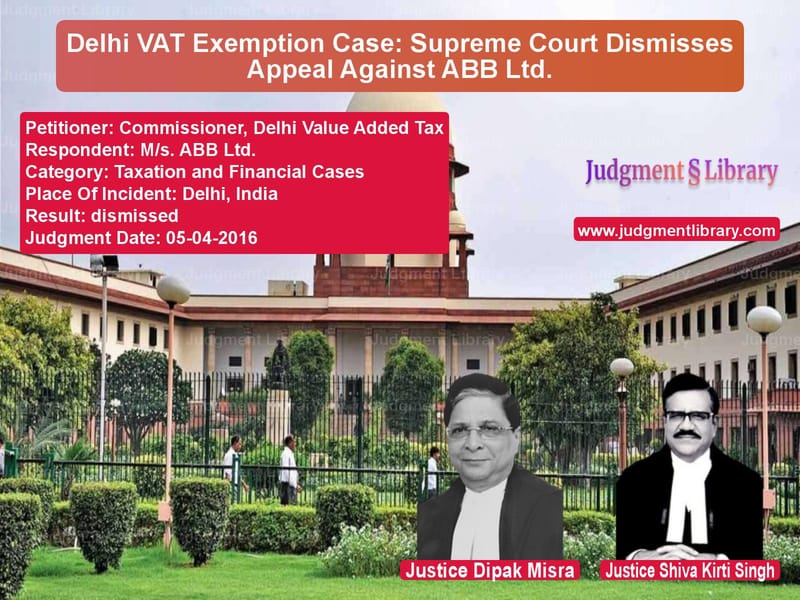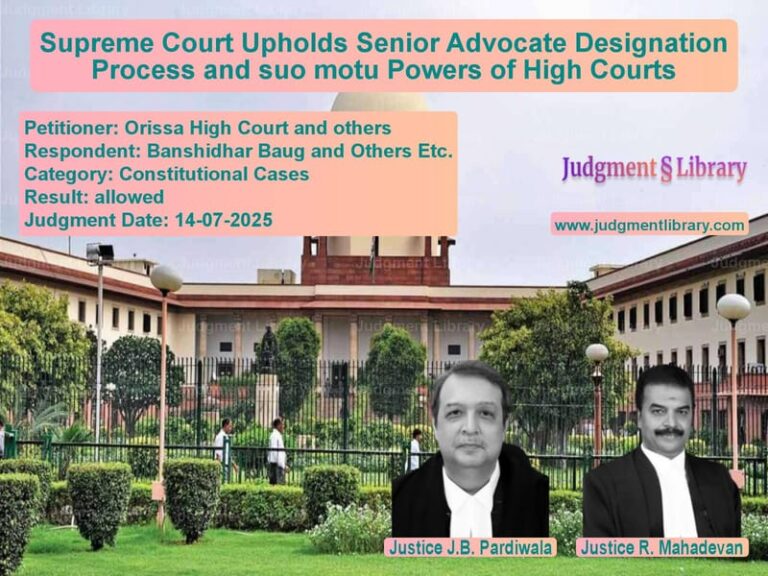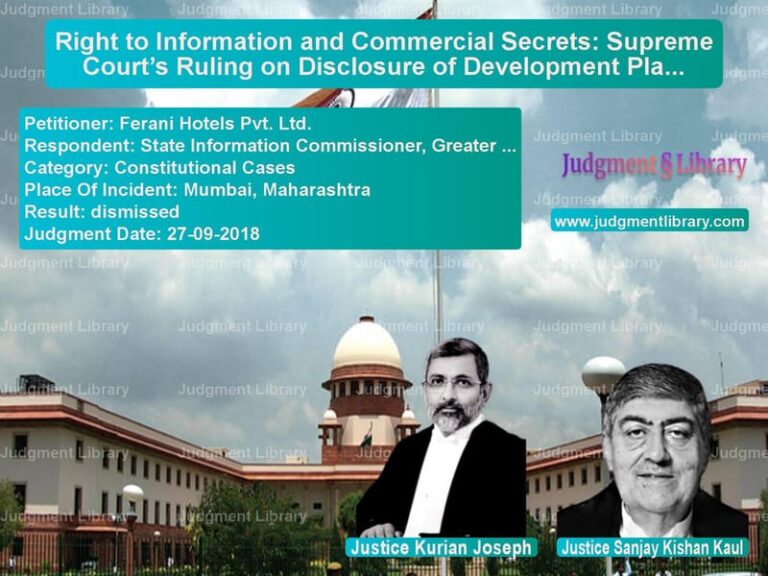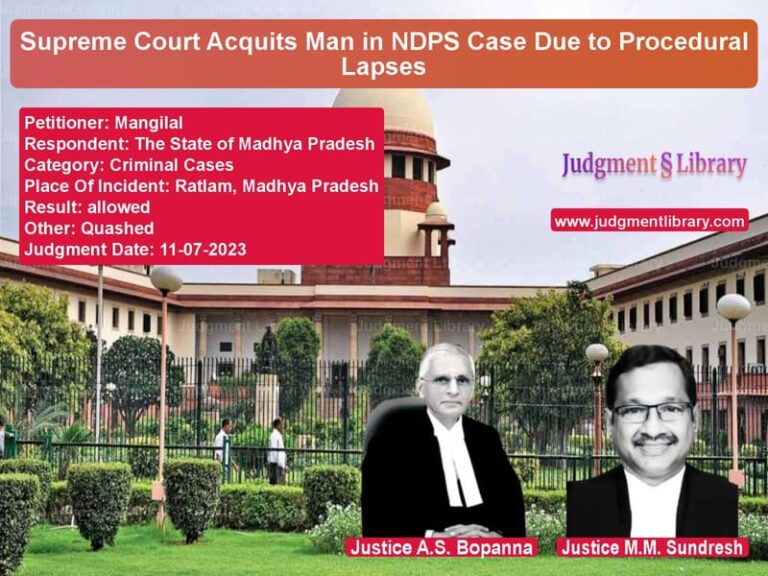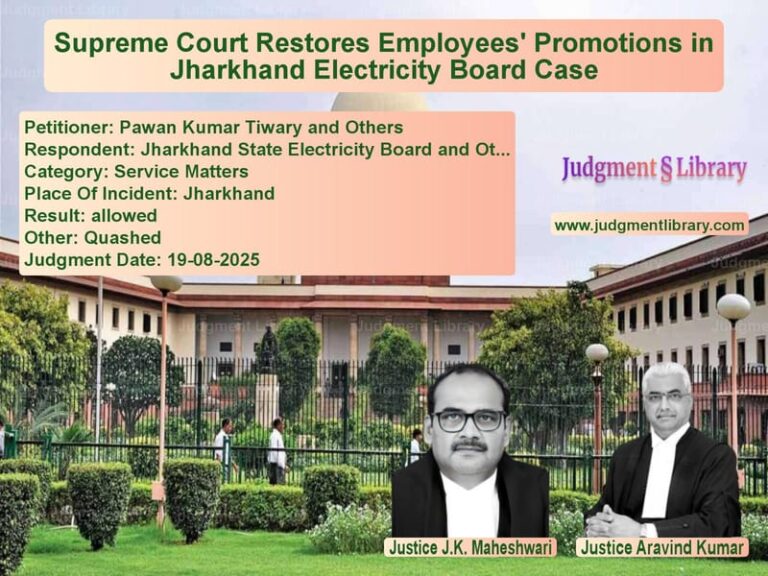Delhi VAT Exemption Case: Supreme Court Dismisses Appeal Against ABB Ltd.
The Supreme Court of India recently ruled in Commissioner, Delhi Value Added Tax v. M/s. ABB Ltd., a case concerning tax exemption under the Delhi Value Added Tax Act, 2004 (DVAT Act) and the Central Sales Tax Act, 1956 (CST Act). The case involved a dispute over whether sales to the Delhi Metro Rail Corporation (DMRC) qualified as inter-State sales or sales in the course of import, thereby making them exempt from taxation under the DVAT Act.
Background of the Case
The Commissioner of Delhi Value Added Tax (DVAT) challenged a Delhi High Court ruling that exempted ABB Ltd. from tax liability on sales made in connection with a contract with DMRC. The High Court reversed decisions by the VAT Tribunal and lower tax authorities, holding that the movement of goods was integral to the execution of the works contract and thus qualified as inter-State trade or sales in the course of import.
ABB Ltd. had supplied electrical and automation equipment to DMRC under a contract for the Barakhamba Road-Connaught Place-Dwarka Section of the metro. The Delhi tax authorities contended that these transactions were subject to VAT, while ABB Ltd. argued that the sales were either inter-State sales or import transactions exempt under Sections 3(a) and 5(2) of the CST Act.
Legal Issues Considered by the Supreme Court
- Whether the transactions between ABB Ltd. and DMRC constituted inter-State sales under Section 3(a) of the CST Act.
- Whether these sales were in the course of import under Section 5(2) of the CST Act, thereby exempting them from Delhi VAT.
- Whether the High Court correctly applied the principles laid down in previous Supreme Court rulings.
Arguments by the Appellant (Commissioner, Delhi Value Added Tax)
- The contract between ABB Ltd. and DMRC was for the execution of a works contract and not for the direct sale of goods.
- There was no direct link between the contractee (DMRC) and the foreign suppliers from whom ABB Ltd. procured goods, disqualifying the transactions from being treated as sales in the course of import.
- The movement of goods within India was incidental and not a direct condition of the contract.
- The High Court misinterpreted the ruling in K.G. Khosla & Co. v. Deputy Commissioner of Commercial Taxes, Madras, which was later clarified in Binani Bros. v. Union of India.
Arguments by the Respondent (ABB Ltd.)
- The contract required ABB Ltd. to procure specific goods that had to be imported or sourced from designated suppliers in different states, proving that inter-State movement was a necessary condition of the contract.
- DMRC had pre-approved vendors, and goods were manufactured and supplied strictly as per contract specifications.
- The inter-State movement of goods was not incidental but an essential condition of fulfilling the contract.
- The High Court correctly relied on K.G. Khosla, which has been consistently upheld in later judgments.
Supreme Court’s Judgment
The Supreme Court dismissed the appeal, affirming the Delhi High Court’s ruling that ABB Ltd.’s transactions with DMRC qualified as inter-State sales and sales in the course of import, exempting them from Delhi VAT. The key findings were:
- The contract specifically required ABB Ltd. to source goods from identified vendors, ensuring that inter-State movement was integral to the sale.
- DMRC exercised strict control over procurement, approval of suppliers, and acceptance of goods, confirming that the movement of goods was a direct consequence of the contract.
- The ruling in K.G. Khosla was applicable, as the movement of goods was occasioned by the contract and was not a mere incidental occurrence.
- The decision in Binani Bros. was distinguishable, as the facts of that case differed significantly from the present case.
The Court observed:
“The movement of goods by way of imports or by way of inter-State trade in this case was in pursuance of the conditions and/or as an incident of the contract between the assessee and DMRC. The goods were of specific quality and description for being used in the works contract awarded on a turnkey basis, and there was no possibility of such goods being diverted by the assessee for any other purpose.”
Implications of the Judgment
- Reinforces the principle that inter-State movement of goods that is contractually required qualifies as inter-State trade under Section 3(a) of the CST Act.
- Provides clarity on when transactions are considered sales in the course of import under Section 5(2) of the CST Act.
- Limits the scope of Delhi VAT in cases where contractual conditions necessitate procurement and movement of goods across state borders.
- Sets a precedent for tax disputes involving infrastructure projects and large-scale procurement contracts.
Conclusion
The Supreme Court’s ruling in this case provides much-needed clarity on the applicability of inter-State sales and sales in the course of import for tax purposes. By affirming ABB Ltd.’s exemption under the CST Act, the Court reinforced legal principles governing contractually obligated movement of goods. This judgment will serve as an important reference for future tax disputes involving large-scale infrastructure projects and contractual obligations.
Don’t miss out on the full details! Download the complete judgment in PDF format below and gain valuable insights instantly!
Download Judgment: Commissioner, Delhi vs Ms. ABB Ltd. Supreme Court of India Judgment Dated 05-04-2016-1741854575739.pdf
Direct Downlaod Judgment: Direct downlaod this Judgment
See all petitions in Income Tax Disputes
See all petitions in Tax Evasion Cases
See all petitions in Tax Refund Disputes
See all petitions in Judgment by Dipak Misra
See all petitions in Judgment by Shiva Kirti Singh
See all petitions in dismissed
See all petitions in supreme court of India judgments April 2016
See all petitions in 2016 judgments
See all posts in Taxation and Financial Cases Category
See all allowed petitions in Taxation and Financial Cases Category
See all Dismissed petitions in Taxation and Financial Cases Category
See all partially allowed petitions in Taxation and Financial Cases Category

